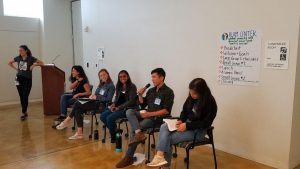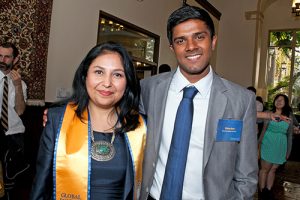![]() By: Abby Madan, 2nd Year Political Economy Major
By: Abby Madan, 2nd Year Political Economy Major
March 20, 2014 – UC Berkeley’s Development Impact Lab (DIL) is forging a new, interdisciplinary field of academic and applied research – Development Engineering (DevEng) – housed at the Blum Center.
Development Engineering seeks to train a new cadre of experts to tightly integrate social and economic insights in the development of technology and services to address the problems of poverty. DevEng’s inaugural “Research in Action” speaker series explores current scientific and technological efforts to address global development issues, bringing experts together in an interdisciplinary space.
“Too often, a great idea is tested and approved before its effectiveness on a larger scale can be evaluated,” explains Alice Agogino, UC Berkeley Professor of Mechanical Engineering. “It takes many aspects and disciplines that involve technology, impact analysis and economics. We want to engage the academic community to test and refine our approaches to development.”
The seminar series features weekly talks from academics and professionals who contribute to the intellectual sphere that constitutes DevEng. Speakers come from a wide variety of disciplines, including computer science, economics, mechanical engineering, electrical engineering, bioengineering, civil and environmental engineering, information management, public health, and business. All of the expertise is required to solve the big challenges facing society.
DIL partner Gaetano Borriello, Professor of Computer Science & Engineering at University of Washington and creator of Open Data Kit (ODK), addressed a packed audience on the functions and processes of his technology at the inaugural seminar. ODK is an open-source toolkit that has simplified the ability for users to build forms, analyze, transfer and share data on various platforms. ODK is being used by thousands of people in a wide variety of ways. In Tanzania, ODK works with the Jane Goodall Institute to map unsafe areas for chimpanzees using data submitted over mobile phones; in the Congo, a visual version of the software enables illiterate Pygmies to track poachers’ locations; and in dozens of other countries, the tool is used to conduct public health and socioeconomic surveys.
The “Research in Action” events create a forum where faculty and practitioners with extensive applied expertise can engage with intellectually curious students who bring their own innovative ideas.
“We’re all coming together to this with different perspectives, different backgrounds, different biases,” said UC Berkeley bioengineering professor Dan Fletcher during a “Research in Action” seminar on CellScope, a smartphone-enabled microscope technology used for remote diagnosis in developing countries. CellScope, a student innovation, uses consumer technology to extend access to health care; it is being used to detect corneal diseases in Thailand, tuberculosis in Vietnam, oral cancer in India, and to image worms in Cameroon. The CellScope case study particularly resonated with the audience. According to Dr. Fletcher, its materialization was heavily dependent on the collaboration of technologies, ideas, and disciplines.
The speaker series is helping build momentum toward the launch of a formal designated emphasis (DE) graduate program, which would be available to UC Berkeley doctoral students who have an interest in DevEng. The program is co-directed by UC Berkeley faculty Alice Agogino, Professor of Mechanical Engineering, and Clair Brown, Professor of Economics. The intention for this DE rests on the belief that the most powerful advances in development can be propelled through interdisciplinary collaboration and analysis of development solutions.
“Specifically,” explained Brown, “the goal of a Designated Emphasis in Development Engineering is to facilitate and formalize an intellectual community to use advanced science, economics and technology for potential solutions to complex global issues.”
The DE will require one main course, one research seminar, and a series of electives relevant to students’ research interests. It will focus on human-centered design along with participant feedback, impact evaluation, econometrics, automated data collection, and sustainability of new technologies. The program will be offered to doctoral students from the natural sciences, engineering, mathematics, computer science, information management, quantitative social sciences, and business programs.
Weekly DevEng “Research In Action” seminars are held on Wednesdays at 4pm in B100 Blum Hall and will run through April 23, 2014. All students and faculty who wish to learn more about the program are welcome.
Students and faculty at UC Berkeley are also encouraged to submit feedback and get involved in the creation of the DE. For more information, visit http://dil.berkeley.edu/students/designated-emphasis/ and subscribe to the DevEng listserv.





